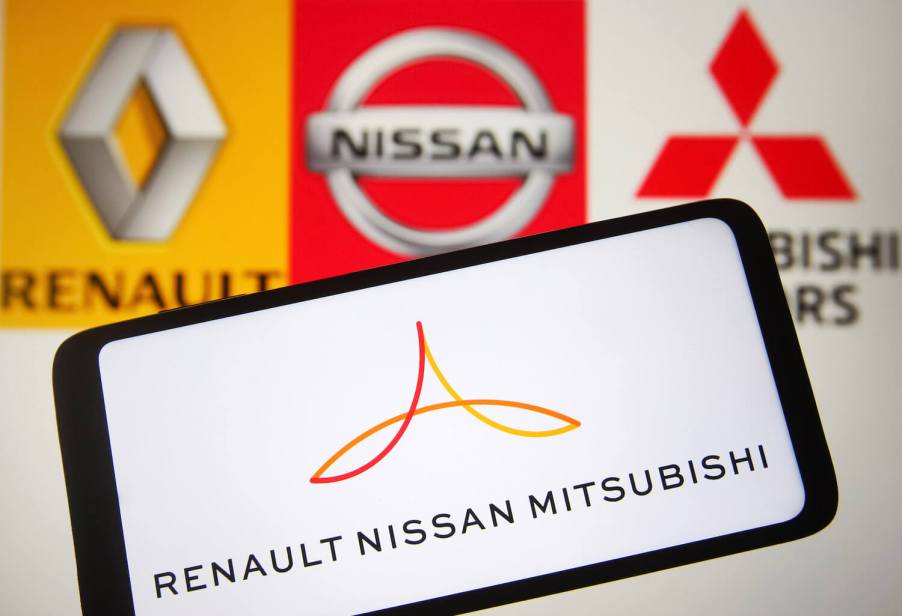
Renault and Nissan’s Relationship Status: ‘It’s Complicated’
When Renault’s CEO proposed an “alliance” to Nissan, he differentiated it from a merger by comparing the arrangement to a marriage. He promised both brands would “retain their own individuality and join to build a life together.” But this marriage has soured, the French and Japanese governments have gotten involved, the sweet-talking CEO was arrested, and Nissan is demanding it gets more say in the arrangement. This year, Renault promised its partner-corporation that it would change its ways.
Does Renault own Nissan?
Renault is quick to say that it has an “alliance” with Nissan because both companies own shares of one another. But some industry analysts claim Renault is in control, as evidenced by its voting on the board of Nissan while denying Nissan a voting seat on its own board.

By 1999, Nissan was struggling financially. The automotive industry had just experienced several high-profile buyouts, including Daimler’s 1998 acquisition of Chrysler Corporation, which created Damiler-Chrysler. But Renault’s CEO, Carlos Ghosn, argued that these acquisitions were doomed to fail because when stripped of its unique identity, an automotive company is doomed to fail.
Nissan and Renault settled on an “alliance.” The plan was to buy stock in one another and establish a third corporation in neutral Amsterdam, chaired by executives of both companies, to decide how the automakers could most effectively join forces.
Products of the Renault-Nissan Alliance include many re-badged vehicles. For example, the popular Renault Duster is based on the Nissan Cube’s chassis, and the Renault Alaskan is a re-badged Nissan Frontier. In addition, Nissan’s successful new van division is made of rebadged Renault vehicles developed for the European fleet market.
The two companies established the Renault-Nissan Purchasing Organization, which negotiates low prices for raw materials by buying in bulk. Renault increased productivity 15% by learning from implementing the “Nissan Production Way.” Finally, the two automakers are splitting the high costs of researching and developing electric and self-driving vehicles. Mitsubishi has even joined this alliance, and the three companies now build 1 in 9 new vehicles sold worldwide.
Trouble in paradise

While the Renault-Nissan “marriage” that CEO Carlos Ghosn proposed may have seemed like a perfect idea, the results have been far from it. After Nissan agreed to an alliance, Renault bought 36.8% of the Japanese company. Moreover, Renault stipulated that these were voting shares so that it could sit on Nissan’s board. Then in 2000, the alliance decided to name Renault’s Ghosn as the CEO of Nissan.
Renault and Nissan worked hard and turned around the Japanese automaker’s fortunes. As soon as Nissan was able, it bought 15% of Renault. You might think this would make the alliance two-sided, but Renault refused to give Nissan a seat on its own board. What’s more, Renault retaliated by buying even more of Nissan, increasing its ownership to 43.4%.
The French government owns 15% of Renault. In 2014, France went so far as to pass a law doubling the voting power of long-term shareholders in French companies. This move seemed targeted at Nissan, as it gave the French government twice as much control of Renault as Nissan had.
Nissan complained and staged a mutiny among shareholders, urging others to vote to opt out of this new law. France’s response was decisive: President Emmanuel Macron bought 1.23 billion Euros worth of Renault, voted down Nissan’s proposal, then sold the shares again. Some analysts labeled this a government-led corporate raid.
The Japanese government’s response was decisive: it arrested Carlos Ghosn for under-reporting his salary and misusing company assets in his role as CEO of Nissan. Because Japan was slow to even give Ghosn a trial, he escaped the country, hiding in a subwoofer box to evade airport security, and flew back to his home in Lebanon. He has since been dismissed from both Nissan and Renault.
Renault promises to change

Blocked from buying more of Renault, Nissan has purchased 34% of Mitsubishi. This move transformed the merger into the Renault-Nissan-Mitsubishi Alliance. Nissan has also threatened to leave Renault, but more recently admitted that dissolving the alliance is not an option. As the industry moves toward electrification and automation, the mounting cost of research and development makes it increasingly difficult for small automakers to survive.
In January 2023, Renault, Nissan, and Mitsubishi announced they would restructure their partnership. According to Nissan News, the three companies will redistribute the shares of one another that they own, aiming to each have 15% of the other two automakers. Moreover, Nissan and Renault will be allowed two representatives on one another’s boards. We will have to wait and see if–after 20 years of this corporate marriage–Renault can change its ways.
Next, find out how pandemic, weather, and war are conspiring to cripple the auto industry, or learn more about the Renault-Nissan Alliance shakeup in the Wall Street Journal video below:




